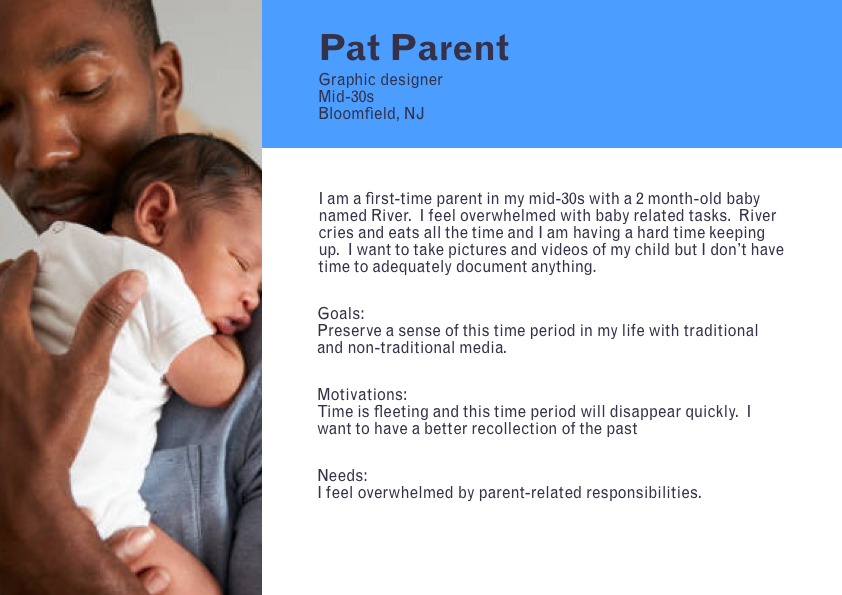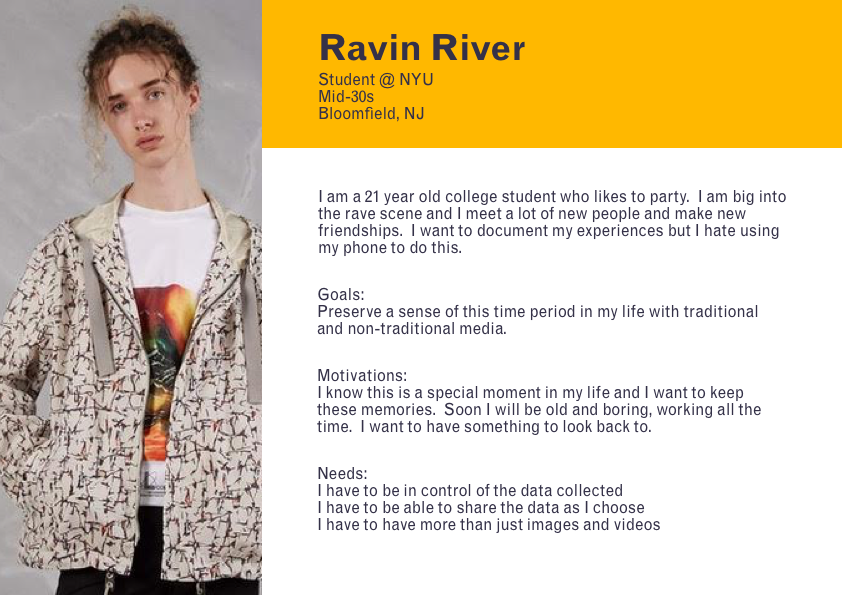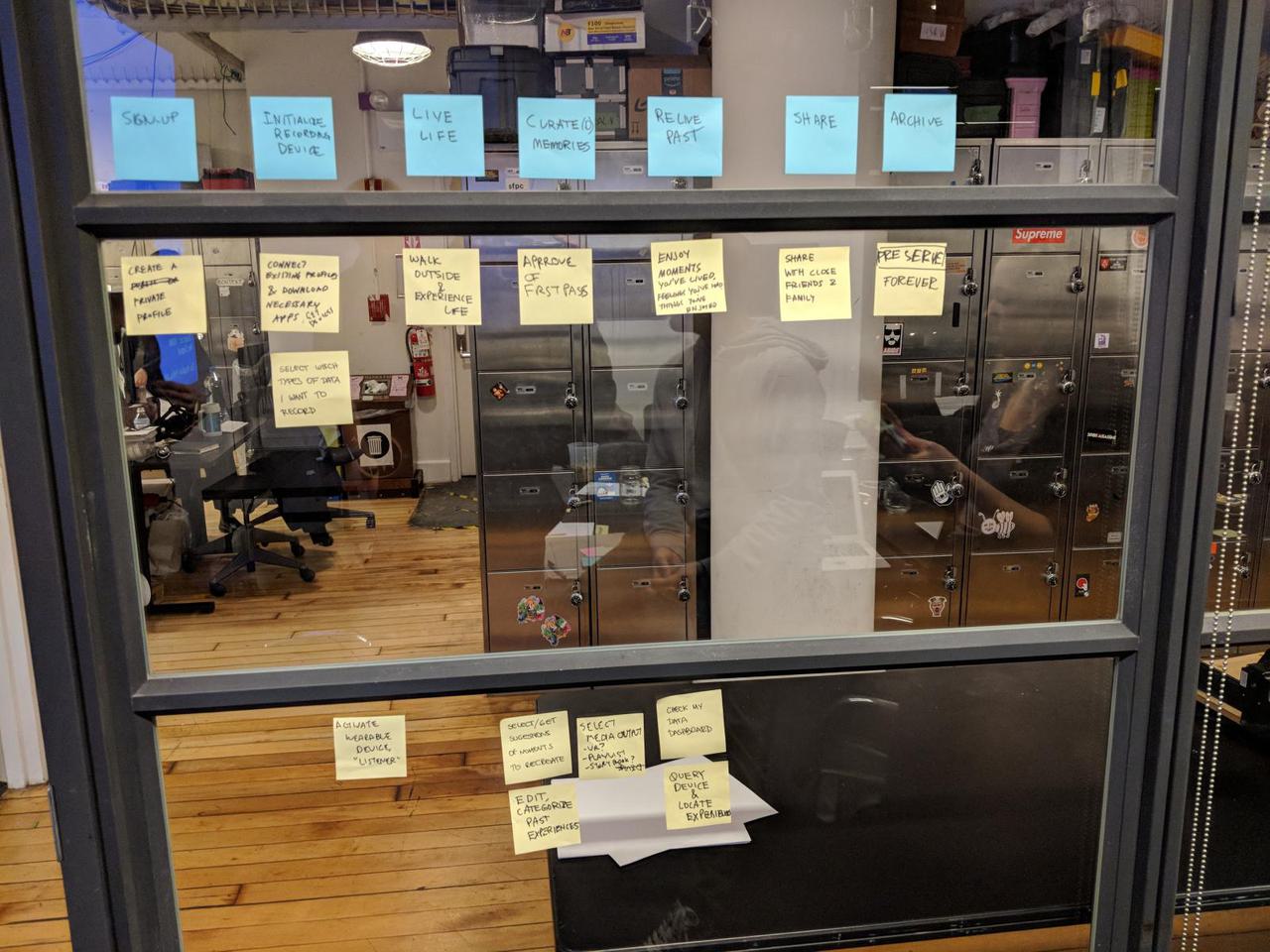Readout, User Interviews, and Technology Research
Our second assignment for Collaborative Design is to complete a "Readout" for our project. We now have a name for our project and a brief elevator pitch. We also did a few user interviews and thought about the technology we might use to build a proof of concept.
Recap
But before we get to that, let's recap our project use case and personas:
I am going through life and I don’t want to be burdened by documentation. I want to have the ability to re-live important and meaningful experiences without documentation tasks taking away from my ability to live in the moment.
And the personas for the use case:


Story Map
Using this as a foundation, we brainstormed the story map for how this will all work. Again, our group used many postit-notes:

If you can't read that, here are the steps:
-
Sign up
Create a private profile
-
Initialize recording device
Get device. Connect existing profiles & download necessary apps.
Select which types of data I want to record
-
LIVE LIFE
Walk outside and experience life
-
Curate(d) memories
Approve of first pass
-
Relive Past
Enjoy moments you've lived, feelings you've had, things you've enjoyed.
-
Share
Share with close friends and family.
-
Archive
PRESERVE FOREVER
Elevator Pitch
Using the story map we developed a brief elevator pitch.
What was playing on the radio when your child uttered their first words? What brand of perfume did your grandmother wear?
ReLive is an AI-powered device that gives you the ability to record important life events as they happen and access them later through rich data and multi-media sensations. By using a passive “life capture” technique, ReLive also allows you to live in the moment, unencumbered with the burden of recording those events.
In short, ReLive gives you the power to live your life - and experience those precious moments again even more intensely.
User Interviews
We also did some user interviews. Here is a selection of questions and answers.
How do you access your memories from your childhood? Do you have pictures?
No albums. It's not a conscious process.
I never look at my photos. It's more of a pathology than anything else.
If there was some kind of wearable recording device that would collect images for you, would you be interested in using it?
No.
Would you be interested in an AI that curates this for you?
It sounds hellish to me.
I am not the customer for this. I don’t want wearable tech.
I want to disconnect more. I am not looking for further ways to optimize consumption. I want to make more time for analog processes. Do not try to sell me wearable tech.
Overall user interviews provided negative feedback for our project. Nobody was interested in using this. This was unexpected given the level of enthusiasm for the idea from within our group.
Technology Research
And finally, technology research.
The ideal solution would involve some kind of brain-computer connection whereby a computer could have direct access to how we experience the world, record the relevant experiences, and curate and filter them for us. There is some research being done to build these connections. The most well-known is Elon Musk's startup company Neuralink. It is unclear what kind of progress the company has made to date though.
There are scientific papers that show researchers that have been able to make tangible progress creating neural links. Consider the paper Stable long-term chronic brain mapping at the single-neuron level. These researchers were able to inject electronics directly into the brains of mice and not adversely impact their lifespan. This show that they can both inject electronics though a needle without destroy it and the electronics can remain in place without being rejected by the host organism. Much more work needs to be done but this demonstrates the idea has potential.
A functioning brain-computer connection may be a reality one day but most likely it will be a long time before it becomes a stable consumer product. A more feasible product that can be built in the short term might be something that leverages the Large-scale Image Memorability research project. This is a Neural Network that has been trained to estimate how memorable a photograph is. It is remarkable that this is possible. A device powered by this AI system could be connected to a user body-cam that sees all that the user sees. The AI can monitor the video feed and save photos it deems to be valuable.
We are eager to discuss this and get feedback tomorrow during class.
Comments